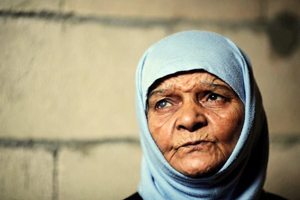
A Syrian refugee in Lebanon’s Bekaa Valley where Caritas is working to provide humanitarian aid.
Credits: Sam Terling/Caritas Swiss
Syrian refugees fleeing to Lebanon, Jordan and Turkey have lost their homes, their belongings and their jobs or schools. They’ve witnessed war at home and faced a perilous journey to escape. (Caritas emergency appeal on Syria)
Now, as refugees, they live in tents, makeshift apartments or in tiny rooms. In Lebanon, eight of ten need food, seven out of ten need shelter and three-quarters of the children have no access to education.
While much of their suffering is visible, many are also dealing with the trauma of their recent experiences. The refugees are also worried about loved ones still in Syria or transfixed by the stream of terrible news as their country is torn apart. Depression, anxiety, insomnia, neurosis and stress are common.
In a Caritas survey of 950 Syrian men and women refugees aged between 18 and 60 in Jordan, one in five people were in need of some form psychological therapy. The findings were part of a general health survey Caritas Jordan carried out between January and March this year in various locations across the country with both newly arrived and established refugees.
In Lebanon, Caritas says many people are suffering different kinds of trauma and need therapy due to their war experiences. Caritas Lebanon social workers have noticed many social and family problems, such as domestic violence, couples breaking apart and children who are traumatized after experiencing being kidnapped in Syria.
Ibrahim, a 60 year old man, escaped his village in north eastern Syria when it came under attack. His family were split up, two sons went to Turkey and his wife and another son now live with him in Lebanon. He spends his days pacing outside his refugee quarters or glued to the TV news from Syria, most of which is, he says, “blood and destruction”.
Halabia Althaner saw one child killed in an attack and has two children missing. She escaped to Jordan. Her husband has had a stroke as a result of the stress and she is suffering from severe headaches.
She left two married daughters behind in Syria. She has had no word from them for months. “You have to give up because they might be kidnapped,” she said. “I think if they were alive, we would have heard something.”
Caritas is providing material help to both Ibrahim and Halabia, but helping the Syrian refugees goes much further than food, blankets and shelter.
“Nobody can get on with their normal lives if they are mentally ill,” said Caritas Jordan psychologist Lana Snobar. “The refugees need to be able to talk about their experiences. They need to express their fears. We try and get them to do activities that they find relaxing like sport or socialising.”
Caritas Lebanon is starting two new projects to provide therapy for 2240 men, women and children in the Bekaa Valley, Beirut, Mount Lebanon and the North. They will benefit from group and art therapy, and individual counseling. Caritas will refer women and children who have been abused to safe shelter, where they will also benefit from psychological treatment.
In Jordan, Caritas provides counseling to those in need either through individual or group therapy. Severe cases are referred to hospitals if they need intensive intervention. Staff who come into contact refugees received training in April on how to provide psychological support and how to identify Post-Traumatic Stress Disorder.
“Some people who don’t get treatment can resolve their issues through prayer or with the support of their family, said Lana Snobar. “Others develop mild or high psychological disorders.”
The cause of the suffering continues. By April 2013, the Syria conflict had claimed 93,000 lives, of those, 1,729 were reported to be under the age of 10. As the crisis enters its third year, Caritas says that the refugees are not just fleeing conflict but also a lack of food, medicine, healthcare and education as the country collapses.
Caritas Lebanon is aiding close to 90,000 people, half of which are children. Caritas Jordan has registered over 113,000 for its help. The assistance ranges from protection, food, shelter, clothing, counselling, health and education. Around 90 percent of the Syrians Caritas helps are Muslim. Caritas is also working inside Syria and in Turkey.
